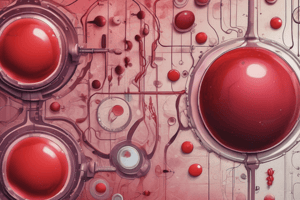Podcast
Questions and Answers
What is the definition of ABO discrepancies in immunohematology?
What is the definition of ABO discrepancies in immunohematology?
- It occurs when both red cell and serum testing show expected reactions.
- It occurs when red cell testing does not agree with the expected serum testing. (correct)
- It occurs when extra reactions are noted in both red cell and serum tests.
- It occurs when red cell testing agrees with the expected serum testing.
Which of the following is suspected when ABO discrepancies occur in immunohematology?
Which of the following is suspected when ABO discrepancies occur in immunohematology?
- Expected reactions in ABO red cell testing and serum testing are missing. (correct)
- Agglutination strengths of the typing reactions are stronger than expected.
- There are no unexpected reactions in either forward or reverse typing.
- Extra reactions are noted in both ABO red cell and serum tests.
What category of ABO discrepancies is associated with unexpected reactions in reverse typing due to weakly reacting or missing antibodies?
What category of ABO discrepancies is associated with unexpected reactions in reverse typing due to weakly reacting or missing antibodies?
- Group IV Discrepancies
- Group I Discrepancies (correct)
- Group III Discrepancies
- Group II Discrepancies
Which population is commonly associated with Group I Discrepancies?
Which population is commonly associated with Group I Discrepancies?
When is the production of ABO antibodies not detectable in newborns?
When is the production of ABO antibodies not detectable in newborns?
Which medical condition can lead to depressed production of ABO antibodies?
Which medical condition can lead to depressed production of ABO antibodies?
Which type of discrepancy is associated with unexpected reactions in the forward grouping due to weakly reacting or missing antigens?
Which type of discrepancy is associated with unexpected reactions in the forward grouping due to weakly reacting or missing antigens?
What can be a cause of discrepancies in Group II?
What can be a cause of discrepancies in Group II?
How can discrepancies in Group I be resolved?
How can discrepancies in Group I be resolved?
What is a common population with discrepancies in Group I?
What is a common population with discrepancies in Group I?
What is associated with Group III discrepancies?
What is associated with Group III discrepancies?
What is a possible cause of discrepancies in Group III?
What is a possible cause of discrepancies in Group III?
How can discrepancies in Group II be resolved?
How can discrepancies in Group II be resolved?
What may have been diluted by plasma transfusion or exchange transfusion, causing discrepancies in Group I?
What may have been diluted by plasma transfusion or exchange transfusion, causing discrepancies in Group I?
What may mimic the depression of antigens found in leukemia, leading to discrepancies in Group II?
What may mimic the depression of antigens found in leukemia, leading to discrepancies in Group II?
Study Notes
ABO Discrepancies in Immunohematology
- ABO discrepancies refer to differences between expected and detected ABO blood group antigens and antibodies during testing.
- Discrepancies often signal potential underlying conditions or errors in testing.
Suspected Conditions for ABO Discrepancies
- Conditions such as blood group chimerism, leukemia, or recent transfusions may be suspected when discrepancies occur.
Weakly Reacting or Missing Antibodies
- Group I discrepancies are characterized by unexpected reactions in reverse typing due to weakly reacting or absent antibodies.
Population Commonly Associated with Group I Discrepancies
- Adults and older children may commonly show Group I discrepancies due to factors such as illness or antibody dilution.
Detection of ABO Antibodies in Newborns
- Newborns typically do not produce detectable ABO antibodies until approximately 3 to 6 months of age.
Medical Condition Affecting ABO Antibody Production
- Conditions like immunodeficiency or malignancies, including leukemia, can lead to reduced or absent production of ABO antibodies.
Forward Grouping Discrepancies
- Group II discrepancies result in unexpected reactions in forward grouping due to weakly reacting or missing antigens on red blood cells.
Causes of Discrepancies in Group II
- Evidence of recent transfusions or certain diseases (like leukemia) can cause discrepancies in Group II by altering antigen expression.
Resolution of Group I Discrepancies
- Resolving Group I discrepancies often involves confirming patient history, performing additional serological tests, and ensuring proper blood typing procedures.
Common Population with Discrepancies in Group I
- Frequently observed in individuals with underlying medical issues, particularly those with autoimmune disorders.
Characteristics of Group III Discrepancies
- Group III discrepancies often occur due to factors such as unexpected antigens that lead to unusual test results.
Possible Causes of Discrepancies in Group III
- Potential causes include the presence of unexpected alloantibodies or antibody interference factors.
Resolution of Group II Discrepancies
- Group II discrepancies can often be resolved through enhanced testing methods and recognizing the implications of recent transfusions on antigen levels.
Impact of Plasma Transfusions
- Plasma transfusions or exchange transfusions may dilute antibodies, causing discrepancies in Group I typing results.
Mimicking Antigen Depression in Discrepancy Scenarios
- Conditions such as leukemia can present symptoms that mimic the depression of antigen expression, leading to Group II discrepancies.
Studying That Suits You
Use AI to generate personalized quizzes and flashcards to suit your learning preferences.
Description
Test your knowledge about ABO discrepancies in immunohematology with this quiz. Learn about the causes and identification of ABO discrepancies in red cell and serum testing.




